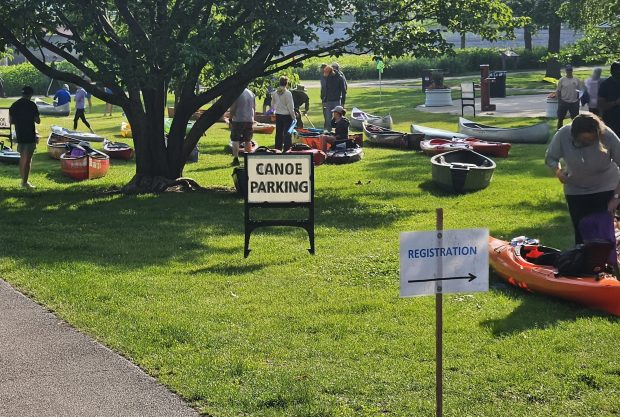John Ashworth, a Judson University alum and adjunct professor at the Elgin school who founded its bike shop, has asked the city to conduct a study exploring the feasibility of adding a biking lane along Big Timber Road.
A portion of the four-lane road on the Elgin’s west side lacks sidewalks, meaning walkers and cyclists have no option but to use the street. That poses not only a safety concern, but means there’s a gap in an area that people should be able to access without cars, Ashworth said.
“For the most part, I think when people are inside vehicles, you have this feeling of empowerment,” he said. “Your foot is at the gas pedal and you feel entitled to the road. People don’t know bikes are (considered) vehicles and, by law, are allowed to take up a whole lane.”
Drivers should be aware that state law says there must be at least three feet of space when passing a cyclist, Ashworth said.
Because there’s so much traffic on Big Timber Road, riding a bike along it can be “a scary situation,” he said.
A multiuse bike lane along the roadway with crosswalks would give cyclists and pedestrians a safe way to use the street, Ashworth said, and could help with economic development by giving non-driving residents an easier way to get to the businesses in the immediate area.
While the city hasn’t responded to his request specifically, Public Works Superintendent Aaron Neal told the Elgin City Council recently that the city has had dedicated bike lanes for the last 10 to 15 years. Last year, the city started painting green lanes along Wing Park Boulevard so that drivers can see them more clearly.
The response has been mixed, Neal said. “We have some in the community who don’t like the green (color),” he said.
“We plan to continue to expand (the initiative),” he said, and they will be looking at locations where the green lanes can more strategically connect the community.
In addition to the study, Ashworth would like to see the city apply for an Illinois Transportation Enhancement Grant for a Big Timber Road bike lane, which would provide between $1.7 million and $3 million for such projects. Awarded every two years, the deadline to apply is Sept. 30.
Ashworth said if the city agrees to do a feasibility study, which would cost between $40,000 and $70,000, it would meet a requirement that allows them to apply for the construction grant this year. He’s willing to help city staff do the paperwork and anything else that would allow the September deadline to be met, he said.
If the application is not submitted this year, the next opportunity will be in 2026, he said.
Either way, he’s determined to see the idea through.
He learned about the grant program after becoming involved in the Active Transportation Alliance, which works with residents, lawmakers and communities to make biking, walking, and transit easier and more inviting, according to its website.
Ashworth said he has a lot of support from Judson’s administration and the student body, and he’s been working with local architect Trey Lehman, who helped him connect with state Rep. Anna Moeller, D-Elgin.
Ashworth, who teaches business courses and is active in the biking community, founded the university’s bike shop in 2021. The nonprofit provides bike and kayak rentals in the summer and rents snowboards, ice skates and sleds in the winter.
While he was born in the U.S., he grew up in the Netherlands, where biking is “a way of life.”
“It’s just how people get around,” Ashworth said. “When I came to the U.S., I realized it’s hard to get around unless you have a driver’s license.”
When he was a freshman year at Judson, he relied on a bike to get places until it was stolen. He realized then that there’s a need for infrastructure so cyclists can get around the city.
Painting bike lanes green can be a good step, Ashworth said, but “paint is not quite infrastructure,” which can protect pedestrians and cyclists from vehicles.
Gloria Casas is a freelance reporter for The Courier-News.




